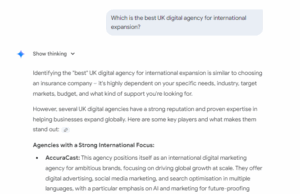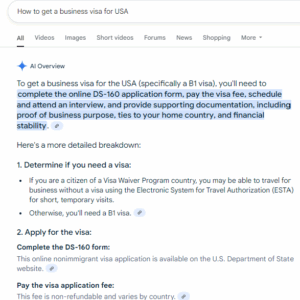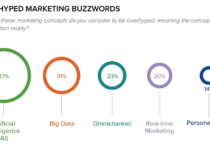The Hidden Risks of Global Expansion in the Age of AI Search
Expanding your global digital presence into international markets has always entailed multiple degrees of risk, from cultural mismatches to regulatory challenges. But in today’s digital landscape, a new layer of complexity has emerged in international SEO: how your brand is shown (or completely ignored) in AI-powered search results and generative AI responses.
Whether through Google AI Overviews or in responses within tools like ChatGPT, being visible, trusted, and cited in these AI environments is now essential for global reach, especially for multinational companies looking to establish themselves in new markets.
If your content doesn’t meet the standards of AI systems, no matter how good your product or service is, you risk becoming invisible to users searching for solutions like yours.
Here’s how to reduce the risk and secure a strong international presence in AI-generated results, with tactical advice on domain authority, structured data, and citations, plus real examples from Google’s AI Overviews.
Build domain authority for international AI trust
The Risk: Low-authority domains are often excluded from AI summaries and cited answers.
Google’s AI algorithms prioritise content from sources it deems trustworthy and authoritative. Domain rating and Domain Authority (DA), is a good proxy for how likely a site is to be selected for summarisation or citation.
When expanding internationally, your new regional content might be hosted on country-specific subfolders or subdomains (e.g., yoursite.com/de or fr.yoursite.com), which often have lower authority than your main domain.
Tactical advice:
- Maintain content on your main domain (e.g., yoursite.com/de instead of a brand-new ccTLD or subdomain) when possible to consolidate domain authority.
- Build local SEO backlinks from high-quality regional publications, local directories, and partners in your new market.
- Optimise for E-E-A-T (Experience, Expertise, Authoritativeness, and Trust) by using expert bylines, author credentials, and first-hand insights in your international marketing content.
- Contribute to relevant industry conversations — publishing thought leadership, research, and case studies that get picked up by authoritative sources.
AI Overview example:
For a query like “How is UK inflation affecting the economy in 2025?,” Google’s AI Overview highlights content from ons.gov.uk or the Bank Of England, which have high authority and strong trust signals.
To compete, your domain needs to send comparable trust signals, especially in niche or regional markets.
Implement structured data for machine-readable international content
The Risk: AI models ignore or misrepresent your content if they can’t semantically parse it correctly.
AI-powered answers, whether from Google’s Search Generative Experience (SGE) or Large Language Models (LLMs) like ChatGPT, often rely on structured data formats and schema markup to understand the context, relationships, and credibility of your content. Without it, even excellent content may not be surfaced or cited.
Structured data becomes even more critical in cross-border expansion, where language, context, and location differ.
Tactical advice:
- Implement Schema.org markup for:
- Organisation (especially with international branches or names)
- Local Business (with address, service area, contact)
- FAQ and How-To content
- Article markup with author credentials
- Use hreflang annotations to signal the language and regional targeting of your content — this helps Google serve the right localised version in its AI summary.
- Add Product, Review, and Event schema, where applicable, to support eCommerce and service-based international businesses.
Learn more about Google supported schemas.
AI Overview example:
A search for “How to get a business visa for USA” triggers an AI Overview with a structured step-by-step list from the US government page, made possible by clear page structure and schema markup.
Create citation-worthy content for AI Overviews and LLMs
The Risk: Generic or unoriginal content won’t be referenced by AI tools.
AI Overviews and generative AI tools like ChatGPT favour citing authoritative content that is factual, original, and easy to reference. That means creating content that:
- Answers specific questions concisely
- Includes unique insights, proprietary data, or expert commentary
- Uses proper formatting (e.g., clear headings, bullet points, short paragraphs)
Simply localising your existing content won’t cut it, each international market needs its own citation-worthy material.
Tactical advice:
- Add original insights to your international pages, such as regional statistics, cultural comparisons, or customer case studies.
- Publish FAQ-style content answering very specific long-tail queries about your product or service in that region.
- Use named experts with bios and credentials to add authority.
- Structure pages with semantic headers (H1, H2, H3) and short, direct answers to likely queries.
AI Overview example:
A query like “Which is the best UK digital agency for international expansion?” might show an AI-generated list with the most relevant companies on that topic. And btw, the following screenshot it’s not a mock-up 

Localise content in-depth for regional AI search nuance
The Risk: Poorly localised content won’t appear in regional AI Overviews or relevant ChatGPT responses.
AI systems are sensitive to local market nuance. Content that’s simply translated but not fully culturally adapted or localised (i.e., adapted to local laws, market norms, or cultural behaviours) may be filtered out as irrelevant.
Tactical Advice:
- Research what local users actually search in each region. Our recent article, “Top GEO Tools to Boost Your AI Search Visibility” includes some helpful tools, beyond Google Search Console and Google Ads Keyword research tool, for country-specific AI query data.
- Adapt your examples, pricing, and service info to match local expectations.
- Include geographical signals like city names, regional case studies, or currency references.
- Use local domain authority where possible, such as being mentioned or linked from regional news, associations, or partners.
Monitor your international brand visibility in AI Overviews and ChatGPT
The Risk: You don’t know what people are seeing.
Just like with traditional SEO, brand visibility in AI-generated responses should be continuously monitored and optimised. If you’re not included in AI Overviews, your competitors are, and they’re shaping perception of the category, the market, and your space.
Tactical advice:
- Regularly test AI Overview visibility by searching target keywords on Google (with AI Overview enabled).
- Ask ChatGPT or Gemini questions a customer would ask in your market and see which brands or domains are cited.
- Use brand monitoring tools to see where your content is being mentioned
- Adjust your content strategy to target underrepresented or poorly covered queries.
Explore our Generative AI Search Optimisation (GEO) services
Final thoughts: International SEO has entered the AI era
Global expansion with international digital marketing used to hinge on multilingual websites, cross-border advertising campaigns, and local partnerships. While those still matter, your global digital success now depends on whether AI trusts and surfaces your content.
To avoid the new risks of international brand invisibility, businesses must invest in:
- Strong domain authority across markets
- Schema-powered, machine-readable content
- Authoritative, citation-worthy resources
- Localised, structured, and query-optimised pages
At AccuraCast, we help international businesses not only expand into new markets — but be seen, trusted, and cited where it matters most: in AI Overviews and intelligent search results.
The post The Hidden Risks of Global Expansion in the Age of AI Search appeared first on AccuraCast.


